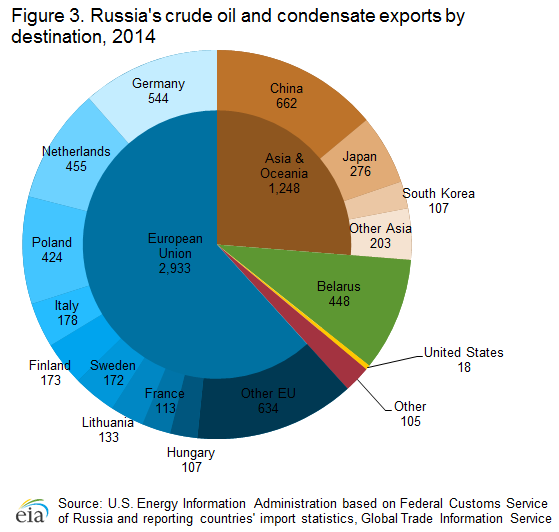The new export duty in Russia will be $88.40 per ton
The export duty on oil in Russia will decrease to $88.40 per ton starting December 1, Alexander Sakovich of the Russian Finance Ministry told TASS. The new export duty represents a 9% decrease from the $97.10 per ton being charged in November. Oil and gas export duties represent a major source of income for the Russian state, with 50% of the federal budget, 70% of export revenues, and 25% of GDP coming from energy exports.
Average oil prices last month amounted to $44.33 per barrel, or $323.60 dollars per ton, Sakovich said. In September, they were slightly higher, averaging $47.18 per barrel, or $344.40 per ton.
About-face; previous legislation looked to increase oil export taxes
The move is an interesting change of heart, as earlier this month, the Russian government discussed increasing taxes on the oil and gas sector, a move endorsed by Russian President Vladimir Putin. The new tax scheme looked to raise an additional 600 billion rubles ($10 billion) per annum by increasing taxes on Russia’s oil and gas industry, reports The Financial Times.
President Vladimir Putin endorsed the move, instructing the government “to work on channeling to the budget additional revenues of export companies, which they received thanks to the ruble devaluation”. Higher profits in ruble terms for the Russian oil and gas sector are perhaps the only silver-lining for Russia as its currency’s value remains around half the value to the U.S. dollar that is has held since late 2009. As Russian oil and gas companies see stronger margins in their dollar-denominated business, the government has looked for ways to tap the industry for more revenue.
The devaluation of the ruble has allowed the predominately dollar-based oil and gas industry to buffer itself against falling oil prices over the last year. A report from Goldman Sachs released in August said, “We expect the Russian majors to generate the highest free cash flow yields globally.”
 Industry sees ad-hoc approach to tax collection as a red flag
Industry sees ad-hoc approach to tax collection as a red flag
The legislation was met with concern from the Russian oil and gas industry, as well as analysts, who felt the ad-hoc approach to tax collection created too much uncertainty in the sector.
Igor Sechin, CEO of Rosneft (ticker: RNFTF), Russia’s largest oil company, predicted raising the taxes as the legislation originally hoped would lead to a drop in production of 25-30 million tons of annual production (about 550 MBOPD, or 5% of total production) within three years.
The legislation was eventually changed to maintain export duties at their current levels next year, reports Financial Times, but it appears the Ministry of Finance has again changed its mind.
In a statement today, Russian Deputy Energy Minister Kirill Molodtsov said the country plans to continue increasing production from current fields rather than exploring for new ones. “We’ve got a safety cushion until 2035,” he said. “The potential for output growth at oil fields already in operation is higher than in unexplored territories.”
A tax system that provides the right incentives could help push production higher, said Molodtsov. Output this year and next is estimated at about 533 million tons, according to his ministry.
Russia looks to sell West Siberia oilfield for up to $1 billion
Denis Khramov, first deputy minister of the Russia’s Natural Resource Ministry, said today that Russia hopes to auction off the Erginskoye oilfield in West Siberia for as much as $1 billion. The auction could come in the first or second quarter of 2016, reports Reuters.
The Erginskoye field has reserves of 103 million tons (755 million barrels) based on Russian standards, but was never developed despite plans dating back to the early 1990s.
Analysts from UralSib said the field, located west of the major Priobskoye field, developed by Rosneft and Gazprom Neft (ticker: GZPFY), the oil production arm of state-controlled gas giant Gazprom (ticker: OGZPY), is close to existing transportation infrastructure, and would unlikely be eligible for tax breaks applicable to remote fields or hard-to-recover reserves.
“Coupled with the low oil prices, it will probably limit the price of the license to $1.0-1.5 per barrel, a total of $0.8-1.1 billion,” they said in a note.







